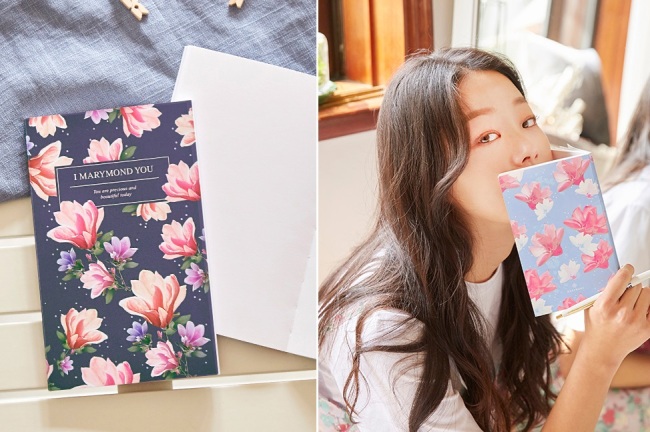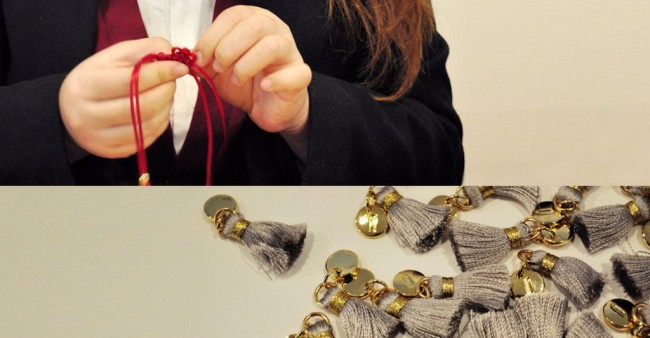[Feature] Wear floral prints and support sex slave victims
Social value-incorporate products becoming more popular
By Kim Da-solPublished : Aug. 27, 2017 - 15:40
Conscious consumers are driving trends behind the popularity of products linked to various social issues, such as floral-print phone cases and stationery items inspired by the drawings of former sex slaves during the World War II.

“I first bought Marymond’s phone case because it was pretty. But by purchasing the product that is designed based on the former sex slaves’ paintings, I felt good to support victims through my consumption,” said 26-year-old Lee Chae-yoon.
Marymond started six years ago as a way to help restore the dignity of the victims, euphemistically called comfort women, who were forced to work at frontline brothels for the Japanese army.
Its products range from stationery to water bottles and smartphone cases. A bracelet attached with a small charm of a girl statue -- a symbol of comfort women -- is sold at 12,000 won ($10), while an eco-bag with simple Marymond logo is 10,000 won. Proceeds from the sale goes into a fund to care for the 37 surviving victims and to establish a sex slavery museum.
“The fact that the product doesn’t explicitly say ‘I support military sex slaves’ makes it more stylish and fashionable,” said college student Kim Ha-yeon, who recently joined the list of people who support victims by using Marymond’s products.
Marymond saw a tenfold jump in sales to 4 billion won in 2016. Its customers include A-list celebrities such as Suzy and Park Bo-gum. Following the recent growth, over 585 million won was delivered to the victims’ shelter last year.
The company’s success is not just driven by public interest in the unsolved issue, a long-standing thorn in Korea-Japan relations, but also reflects the rise of “conscious” consumption, experts say.
“Buying a product from the company that cares about the community makes people feel good and proud to sport the brand. In that sense, it is the charity factor that has caused Marymond to become such a successful one,” said professor Chung Dong-il of Economics from Sookmyung Women’s University.
“Also, there is an emotional impact that is attached to buying a product,” he said.
Like Marymond, Craftlink sells colorful handmade string bracelets to support over 24,000 single mothers in South Korea who live in the shadows of society.

“By buying a trendy accessory, consumers can help others. It makes people feel better about their purchase because they are supporting a good cause with their money,” Martin Ko, CEO of Craftlink, told The Korea Herald.
The company in 2013 sold bracelets made by single mothers worth 30 million won in 20 days through web portal Naver. Early this year, it launched a complete collection of accessory items to support single moms.
“One person, on their own, cannot fundamentally solve or tackle the root of the social problems like the state’s poor support for single mothers, but purchasing a product that is directly connected to their living can have an impact,” Ko said.
Experts said social network services drove the popularity of such items, as interested individuals share information about the social value-added items with their like-minded followers.
“Young generations are creating their own ways of studying historic issues and supporting social movements,” Professor Seo Kyeong-deok of Sungshin Women’s University said in a recent interview.
But there were also concerns over the commercialization of sensitive social and historic issues.
“Sales of social value-incorporated products can support those in need and help raise awareness of social issues, but when an issue related to nationalism is combined with commercialism, there is a possibility that product marketing which only sheds light to sensitive and certain historical facts may lead to exclusions and antagonism,” said professor Lee Taek-gwang of Global Communication from Kyung Hee University.
By Kim Da-sol (ddd@heraldcorp.com)










![[Hello India] Hyundai Motor vows to boost 'clean mobility' in India](http://res.heraldm.com/phpwas/restmb_idxmake.php?idx=644&simg=/content/image/2024/04/25/20240425050672_0.jpg&u=)









